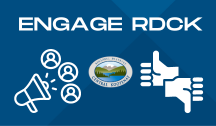ICI Organics
Industrial, Commercial and Institutional Organic Waste Survey Invitation
Owners, Operators, and Managers,
The RDCK Resource Recovery Department is requesting your participation in a survey to acquire information on current organic waste disposal practices in the Industrial, Commercial, and Institutional (IC&I) Sector.
With the investment of over $2 million in infrastructure to accept and process organic waste into compost, the RDCK is working towards reducing, and eventually eliminating the disposal of organic waste in our landfills. Organic waste diversion is a key goal of the RDCK due to environmental and operational necessities.
Currently, the Grohman Narrows Transfer Station, Ootischenia Landfill, Central (Salmo) Transfer Station, and Creston Landfill are able to accept source separated organic waste with no limitations regarding weights or volumes. Organic Waste tipping fees are 35% lower than Mixed Waste ($96.75/tonne vs. $151/tonne). With a wide range of accepted materials, integrating organics recycling into your operations should be relatively cost effective and achievable.
The survey seeks information regarding current organic waste disposal practices, and will help the RDCK identify barriers to participation in organics recycling. Finding additional incentives, knowledge gaps, and resources that will support increased organics diversion/recycling will allow for improved services, more effective policies, and informed decision making as we strive towards zero waste and meeting our diversion targets.
Your feedback and information is extremely valued in this process. Please take 5-10 minutes to help inform services, policies, and regulations regarding the disposal of organic waste in our region’s landfills. We value your feedback and are eager to engage with stakeholders on this topic.
To complete the survey, go to engage.rdck.ca/ici-organics. At the engagement website, you can also ask a questions for staff to answer, or get in touch directly.
Matt Morrison | Organics Coordinator
Environmental Services
Regional District of Central Kootenay
mattmorrison@rdck.bc.ca | organics@rdck.ca
Additional Information:
In 2023, the RDCK completed a comprehensive waste composition study of our regional landfills. The results of this study are publicly available at LINK. IC&I garbage contained on average 35% compostable organic waste. The IC&I sector accounts for 48% of the waste disposed at RDCK landfills.
When organic waste is landfilled, it creates significant problems.
- It takes up finite space, impacting the capacity and lifespan of these costly sites
- It pollutes the environment by contributing to the generation of leachate (run-off from landfills)
- It creates greenhouse gasses
- When organic wastes rot in oxygen-poor environments (e.g. landfills), large amounts of methane are emitted
- Landfill-generated methane accounts for up to 23% of national methane emissions[1]. As a greenhouse gas, methane has a global warming potential more than 80 times greater than carbon dioxide over a 20-year period[2].
RDCK Compost Facilities are designed to accept both pre and post-consumer food wastes, including meat and small bones, dairy, solidified or absorbed oils and fats, soiled paper/cardboard, and 100% plant fiber food wares. All kitchen scraps are accepted. Both self-hauled and contractor hauled loads are accepted. Speak to you hauler and request pricing and service options. Currently haulers are looking to understand demand for services, so reaching out directly will encourage provision of competitive pricing and diverse service models.
Unfortunately at this time, compostable plastic materials are not listed as an accepted item. This is due to concern around the performance of these materials in the composting facilities, and the potential impacts to the finished product (Class A compost). We are working to better understand these material and will be reviewing their performance through testing and review of available data.
For back and front of house support with implementation, the RDCK is working to provide resources. As well, RDCK staff are available for direct consultations and information sharing for operations interested in making these changes.
Thank you for your time and participation in guiding expanded organic waste diversion and recycling.
[1] https://www.canada.ca/en/environment-climate-change/services/managing-reducing-waste/municipal-solid/waste-greenhouse-gases-canada-actions.html
[2] https://www.canada.ca/en/environment-climate-change/services/canadian-environmental-protection-act-registry/consultation-reducing-methane-emissions-oil-gas-sector.html
The content on this page was last updated May 27 2024 at 9:15 AM

